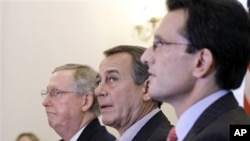The Obama administration says it is ready to push for congressional approval of a free-trade accord with South Korea, but has lingering concerns about deals struck with Colombia and Panama by the former Bush Administration. On Capitol Hill, there is general agreement on the benefits of trade and an overwhelming desire to expand American exports and boost job creation. But sharp disagreements persist on the conditions the United States should place on trading partners.
In a speech Monday to U.S. business leaders, President Barack Obama repeated his commitment to advance free-trade agreements that have been awaiting congressional approval for years. Republicans, like Senate Minority Leader Mitch McConnell, pounced on the comment.
"The president says he wants to double U.S. exports in five years," said McConnell. "Free-trade agreements with Colombia and Panama would go a long way toward meeting that goal. Creating jobs right here in America by opening markets in Latin America."
Democrats say they, too, want to expand trade. But many, like Senator Mark Udall of Colorado, are non-committal about voting for specific trade agreements.
"One of the ways we are going to grow our way out of the economic recession we have been in is to have fair but open trade agreements," said Udall. "And I would welcome the opportunity to look at the three outstanding trade agreements - [South] Korea, Panama and Colombia. I have not made a determination whether I would vote for them or not. But let us at least bring them to the floor of the Senate."
President Obama’s top trade negotiator says the administration will submit the South Korea Free Trade Agreement to Congress in coming weeks. The pact is expected to receive strong bipartisan support in both chambers.
Appearing on Capitol Hill, U.S. Trade Representative Ron Kirk said work remains to be done on two other trade deals.
"We want to work to address outstanding concerns relating to the Panama and Colombia trade agreements," said Kirk. "If we are successful, we will move these forward, as well."
Kirk said the administration wants to see progress on labor rights in Colombia and tax regulations in Panama before trade pacts are approved.
The concerns surrounding Colombia are well-known to human-rights advocates. Gimena Sanchez of the Washington Office on Latin America says Colombian labor leaders are often targeted by paramilitary groups backed by business interests - a situation she says the United States should not reward with expanded trade.
"Labor-rights concerns, unless they are addressed, are going to continue or get worse," said Sanchez. "And that is going to implicate the Untied States."
But Colombia’s government insists the nation has made great strides in human rights and labor protections. This week, the Colombian Embassy in Washington released a statement accusing free-trade opponents of clinging to "old arguments based on Colombia’s past".
Meanwhile, congressional backers of the Colombia Free Trade Agreement accuse the Obama administration of needlessly delaying improved U.S. access to lucrative foreign markets. Republican Senator Mike Johanns of Nebraska:
"In a much-touted speech to the Chamber of Commerce, the president talked about ‘pursuing’ the Colombia trade agreement," said Johanns. "I ask the question: what on earth is left to pursue? The agreement was signed nearly five years ago. It is ready for approval. And if the president thinks there was more ‘pursuing’ to do, what have we been waiting for the last couple of years?"
But Democrats point out that trade deals can be improved. Representative Sander Levin of Michigan praised President Obama for insisting on greater U.S. access to South Korea’s domestic car market than was afforded by the original agreement reached during the Bush administration.
"The way it was negotiated, it [the original deal] did not assure access to the [South Korean] market for our automotive goods," said Levin. "Hyundai has 1,500 dealerships here. Ford has one [in South Korea]. If the Republicans had had their way, we would have approved the Korea Free Trade Agreement having a major part of our economy shut out from their market, when they had complete access to ours."
Majority votes in both houses of Congress are required to approve trade agreements. House Speaker John Boehner has said Republicans stand ready to vote on the three pending accords. A spokesman for Senate Majority Leader Harry Reid tells VOA that votes will be scheduled in the upper chamber once the Obama administration presents the trade pacts to Congress.
Officials See Possible Progress on Long-Delayed US Free-Trade Pacts




